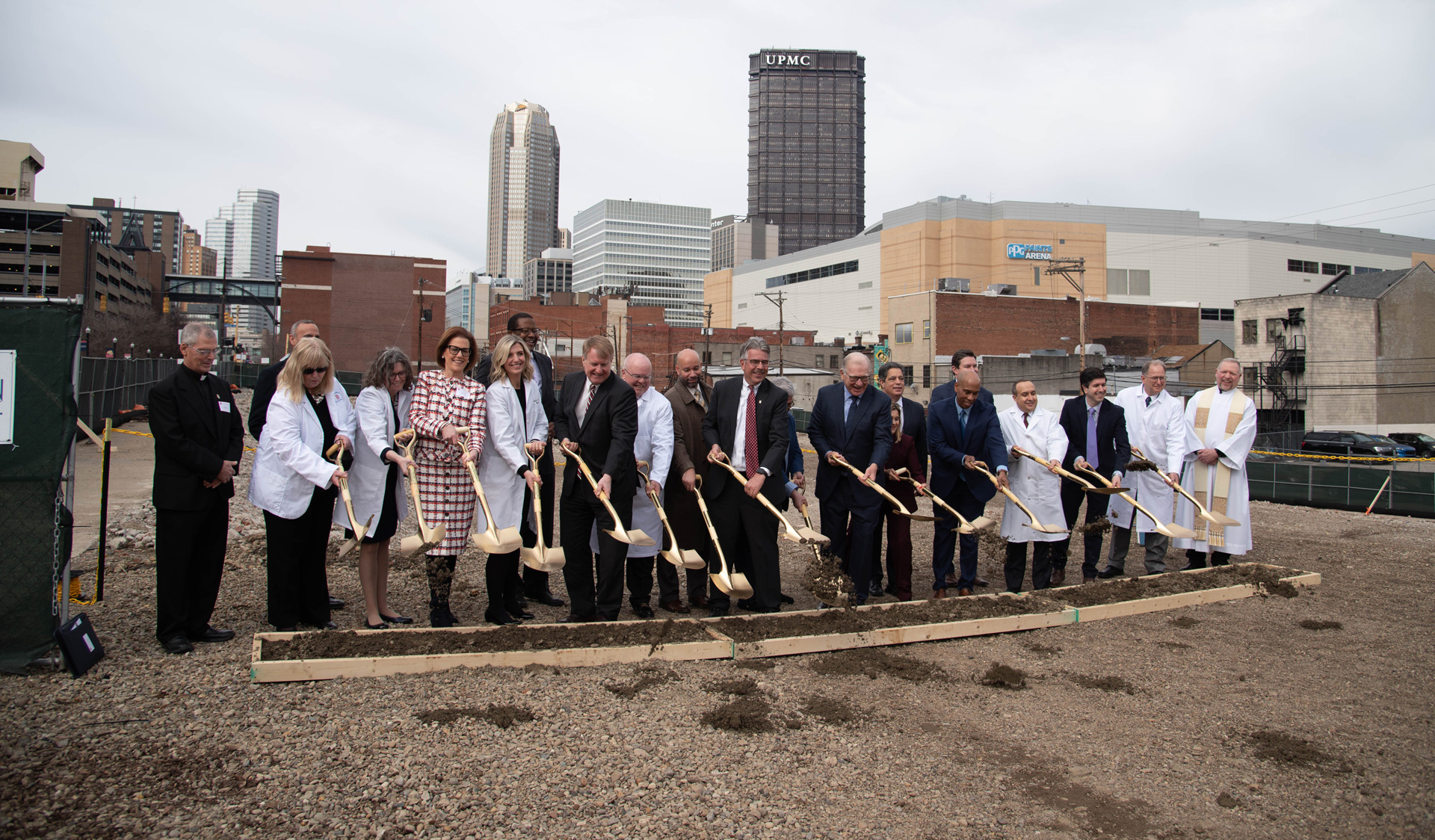DUQUESNE’S BOLDEST VENTURE YET
Dignitaries break ground for new Duquesne medical school building on March 1, 2022.

DUQUESNE’S BOLDEST VENTURE YET
Dignitaries break ground for new Duquesne medical school building on March 1, 2022.
University Breaks Ground on New Medical College
March 1 was a great day for Spiritans.
On that day, a University built on the Spiritan mission of “serving God by serving students” broke ground on a venture that promises to benefit thousands of lives in the Pittsburgh region and beyond.
The groundbreaking ceremony for Duquesne’s proposed College of Osteopathic Medicine was attended by hundreds of people, both inside the UPMC Cooper Fieldhouse and via a livestream. A packed Gilliand Pavilion crowd heard from prominent alumni, local officials, foundation and corporate leaders, and community partners about the impact the new college will have on the region.
“I’m convinced that if the Spiritan founders had arrived in Pittsburgh today instead of 1878, this is exactly what they would be doing,” Duquesne President Ken Gormley told the audience. “Because if ever there was a right time to build a college of osteopathic medicine, it would be right now.”
The college’s launch arrives as the nation faces a looming physician shortage. An Association of American Medical Colleges study estimates that the U.S. will experience a shortage ofmore than 55,000 primary care doctors by 2023. Another study, cited by U.S. News & World Report, indicated that such a shortage could lead to a decrease of the average U.S. life expectancy by two years.
Noting these studies, Sam Reiman, director of the Richard King Mellon Foundation, told the audience that such data indicates more must be done to create, train and support the nextgeneration of physicians to ensure people live healthier, more fulfilling lives.
“Duquesne University’s new school of osteopathic medicine acts upon this data,” he said. “It will mean more primary care physicians in our communities that need them most, both in urban and rural settings. It will mean more diverse primary care physicians in our communities, which data shows will also have a meaningful impact on health outcomes.”
With its expertise in nursing, pharmacy, allied health care and the sciences, Duquesne is perfectly positioned to launch a medical college and continue the University’s legacy of medical excellence, said William Generett, Duquesne’s senior vice president of community engagement and external relations.
The University also has a long history in promoting health equity in the region, having provided thousands of health screenings, flu shots, COVID vaccines and asthma clinics in underserved communities.
“I’m so pleased to say that Duquesne University has been a true community partner,” said Dr. Jerome Gloster, chief executive officer of Primary Care Health Services, which has partnered with the University on several health initiatives for vulnerable populations. “They have reached out to us from the beginning, expressed a desire to help, expressed a desire to question how can we help … and we have worked collectively on these issues and it has been so refreshing.”
When the college launches in fall 2024, it will enroll 85 students with the plan to grow annual incoming enrollment to 170 students beginning in 2026. The college plans to enroll 680 students over all four years by the 2029-2030 school year.
“This new college is the ultimate expression of our commitment to promoting health care equity in the region and beyond,” Gormley said. “It’s our boldest initiative to date and builds on our legacy of making a positive social impact by working with people and communities, including in underserved areas, to help meet critical needs.”
University Breaks Ground on New Medical College
March 1 was a great day for Spiritans.
On that day, a University built on the Spiritan mission of “serving God by serving students” broke ground on a venture that promises to benefit thousands of lives in the Pittsburgh region and beyond.
The groundbreaking ceremony for Duquesne’s proposed College of Osteopathic Medicine was attended by hundreds of people, both inside the UPMC Cooper Fieldhouse and via a livestream. A packed Gilliand Pavilion crowd heard from prominent alumni, local officials, foundation and corporate leaders, and community partners about the impact the new college will have on the region.
“I’m convinced that if the Spiritan founders had arrived in Pittsburgh today instead of 1878, this is exactly what they would be doing,” Duquesne President Ken Gormley told the audience. “Because if ever there was a right time to build a college of osteopathic medicine, it would be right now.”
The college’s launch arrives as the nation faces a looming physician shortage. An Association of American Medical Colleges study estimates that the U.S. will experience a shortage ofmore than 55,000 primary care doctors by 2023. Another study, cited by U.S. News & World Report, indicated that such a shortage could lead to a decrease of the average U.S. life expectancy by two years.
Noting these studies, Sam Reiman, director of the Richard King Mellon Foundation, told the audience that such data indicates more must be done to create, train and support the nextgeneration of physicians to ensure people live healthier, more fulfilling lives.
“Duquesne University’s new school of osteopathic medicine acts upon this data,” he said. “It will mean more primary care physicians in our communities that need them most, both in urban and rural settings. It will mean more diverse primary care physicians in our communities, which data shows will also have a meaningful impact on health outcomes.”
With its expertise in nursing, pharmacy, allied health care and the sciences, Duquesne is perfectly positioned to launch a medical college and continue the University’s legacy of medical excellence, said William Generett, Duquesne’s senior vice president of community engagement and external relations.
The University also has a long history in promoting health equity in the region, having provided thousands of health screenings, flu shots, COVID vaccines and asthma clinics in underserved communities.
“I’m so pleased to say that Duquesne University has been a true community partner,” said Dr. Jerome Gloster, chief executive officer of Primary Care Health Services, which has partnered with the University on several health initiatives for vulnerable populations. “They have reached out to us from the beginning, expressed a desire to help, expressed a desire to question how can we help … and we have worked collectively on these issues and it has been so refreshing.”
When the college launches in fall 2024, it will enroll 85 students with the plan to grow annual incoming enrollment to 170 students beginning in 2026. The college plans to enroll 680 students over all four years by the 2029-2030 school year.
“This new college is the ultimate expression of our commitment to promoting health care equity in the region and beyond,” Gormley said. “It’s our boldest initiative to date and builds on our legacy of making a positive social impact by working with people and communities, including in underserved areas, to help meet critical needs.”
LIGHT THE SPARK…
IGNITE offers an opportunity for everyone who cares about Duquesne to join together in kindling an eternal flame. Every gift—in any amount—transforms the University, changes our students’ lives and strengthens the communities and the world we serve. Now is the time. Join the campaign today.
IGNITE offers an opportunity for everyone who cares about Duquesne to join together in kindling an eternal flame. Every gift—in any amount—transforms the University, changes our students’ lives and strengthens the communities and the world we serve. Now is the time. Join the campaign today.


